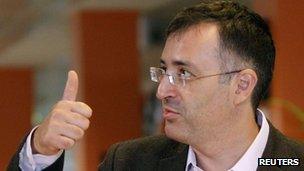Top Russia economist fled over 'fears of losing freedom'
- Published

Leading Russian economist Sergei Guriev has told the BBC he fled to France because he feared losing his freedom on trumped-up accusations.
He said pressure from the authorities had begun after he co-authored a report criticising the conviction of jailed oligarch Mikhail Khodorkovsky.
Mr Guriev, 41, said investigators had questioned him several times, seizing his emails dating back five years.
The ex-head of an elite economic school also said he had no plans to return.
'Real reason'
"I felt that I'm facing the risk of losing my freedom," Mr Guriev, who fled Russia several weeks ago, told the BBC's Newshour programme from Paris.
"Since I've done nothing wrong, I thought that I rather should be in a place where I'm safe," said Mr Guriev, who had been an informal adviser to former President and current Prime Minister Dmitry Medvedev.
Mr Guriev explained that he was concerned he could share the fate of some of the witnesses in the Khodorkovsky case who ended up being defendants.
After his documents had been seized, he said he feared he would first would lose his "freedom to move and then just freedom".
Mr Guriev said he believed he was being harassed for saying what he thought in the report related to the second conviction of former Yukos head Mikhail Khodorkovsky in 2010 for embezzlement and money-laundering.
In the document commissioned in 2011 by Mr Medvedev, Mr Guriev stated that the "case should have not led to the second prison term".
Russian investigators have said that some of the authors of the report could have had a conflict of interest because they had previously received money from Khodorkovsky.
In the BBC interview, Mr Guriev confirmed that his New Economic School in Moscow received a grant from the oil tycoon in 2003.
But he stressed he was away on a sabbatical at Princeton at the time and it happened before he took the helm in 2005.
Mr Guriev's supporters have suggested that the real reason behind the Kremlin pressure is his criticism of some of President Putin's policies and the public backing of leading opposition activist Alexei Navalny.
In the BBC interview, Mr Guriev repeated that he believed "there is no rule of law in Russia".
Mr Putin's spokesman said earlier this week that the Kremlin had no hand in Mr Guriev's departure from Russia.
The BBC's Daniel Sandford in Moscow says many in the Russian elite still have a lot of trust in Mr Guriev.
On Thursday, he was elected to the supervisory board of Sberbank with the highest number of votes, even though he had just confirmed he was not returning to Russia.
- Published17 April 2013
- Published20 February 2013
- Published24 December 2012
- Published25 March